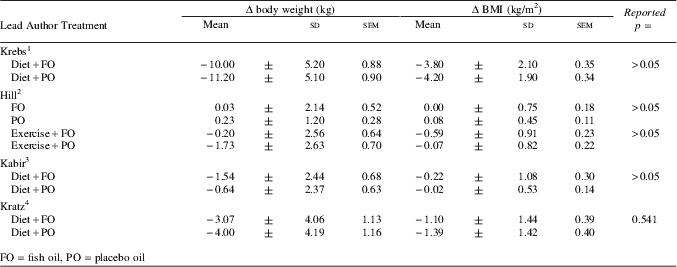There is evidence to suggest that longer-chain polyunsaturated fatty acids (LCPUFA) may have greater appetitive effects than shorter-chain, mono- and saturated fatty acids. The purpose of the following work was to undertake a meta-analysis to examine the strength of evidence for an effect of n-3 fish oil on body weight and body mass index (BMI).
A search of the literature was conducted using Web of Science, PubMed, Medline and Google Scholar for studies having the keywords ‘fish’, ‘fish oil’, ‘oily fish’, ‘omega three’, ‘omega-3’, ‘n-3’, ‘body weight’, ‘body composition’, ‘BMI’, ‘weight reduction’ or ‘weight loss’. Extensive cross referencing searches were also performed and published abstracts were evaluated for inclusion. The initial search revealed fifteen studies. Studies were excluded if they were not randomised controlled trials, had not compared the effect of fish oil supplementation with another (non-n-3) oil control, had not used overweight or obese subjects and had not taken pre- and post-intervention measurements of body weight and BMI; six studies were rejected. Requests for data were only accepted from four research groups. Mean values of pre- and post-intervention body weight (kg) and BMI (kg/m2) were calculated along with the standard deviation and standard error of the mean values. Δ change from baseline and the Δ difference between body weight and BMI changes were also calculated.
None of the studies reported a statistically significant effect of fish oil treatment relative to placebo. Further analysis showed no relationship between body weight change with intervention duration, or n-3 dosage, nor any funnel effect with study sample size.

This analysis does not support the hypothesis that daily n-3 oil supplementation reduces body weight and BMI in the overweight and obese.


